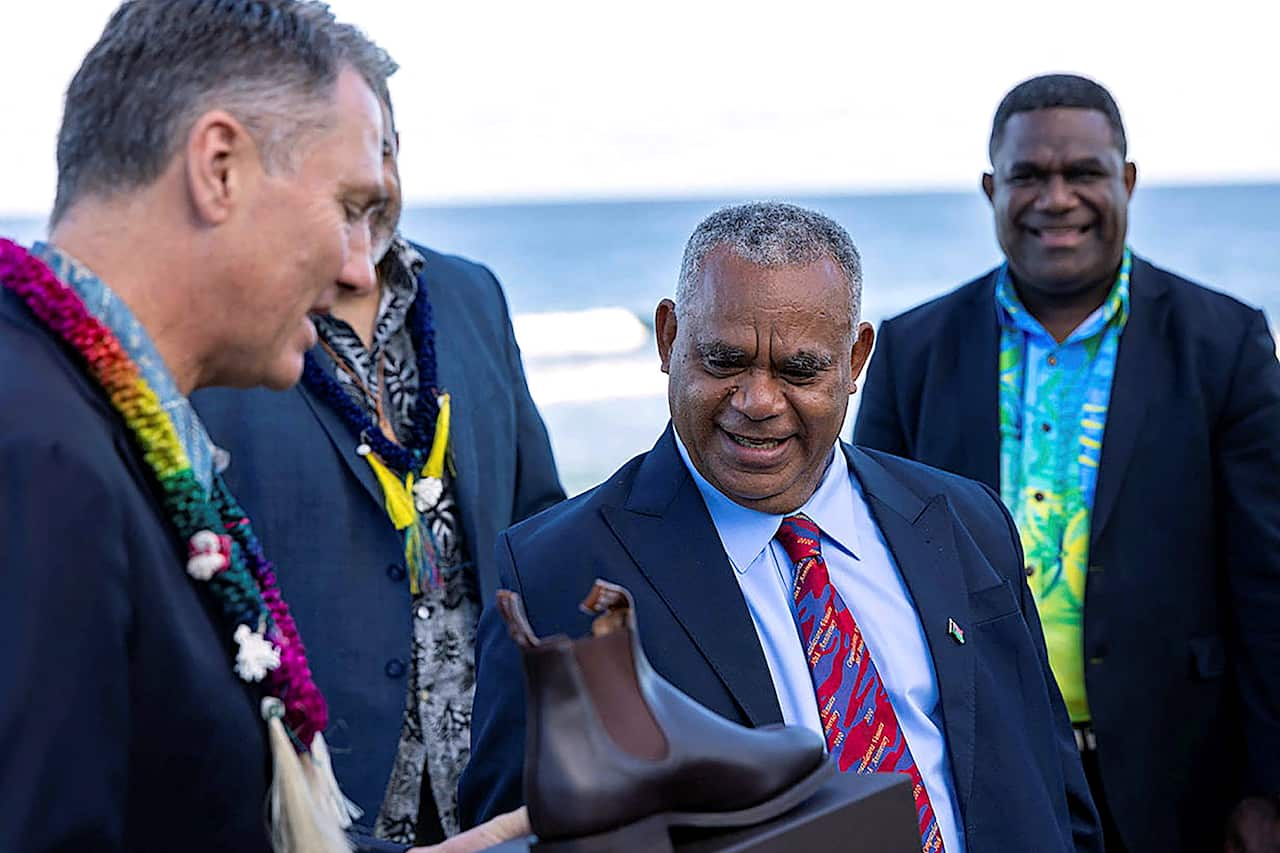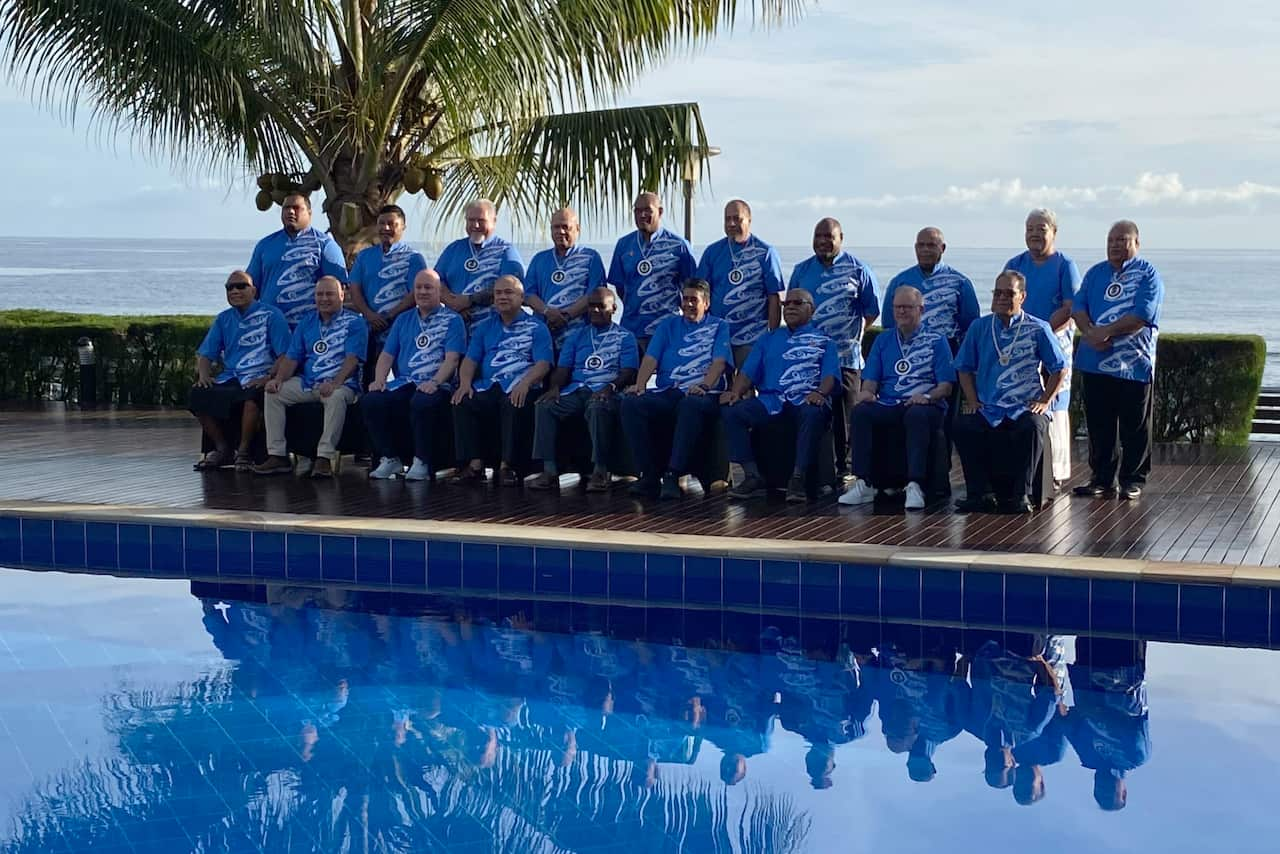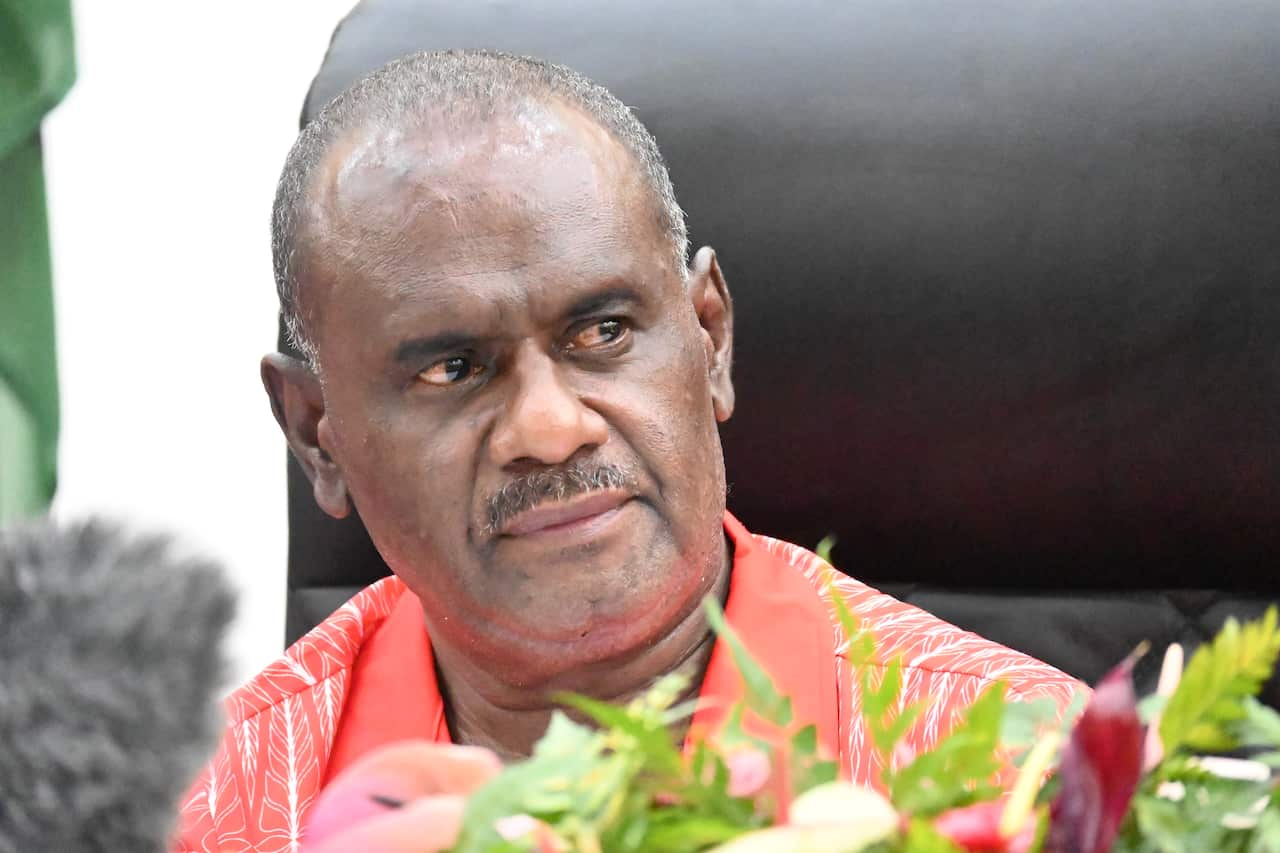Regional security and climate change loomed as major themes as Prime Minister Anthony Albanese embarked on a colourful and at times chaotic visit through Vanuatu and Solomon Islands.
The centrepiece was the Pacific Islands Forum (PIF) leaders' meeting in Honiara. The summit's communique will outline the key outcomes of the forum’s discussions but is yet to be released.
But while Albanese has been keen to highlight a blossoming relationship with the Pacific family, not all has gone to plan.
A Vanuatu eruption
The first stop on Albanese's Pacific trip was Vanuatu, where it was widely expected a long-awaited $500 million pact would be signed with leader Jotham Napat.
The Nakamal Agreement, which would have seen Australia provide an additional $50 million in aid per year to the nation for the next decade, was meant to have been finalised and settled well before the prime minister boarded his RAAF jet.

Last month, Australian ministers trekked to the summit of an active volcano with their Vanuatu counterparts to mark the "finalisation" of the deal — a stratospheric spectacle to celebrate the end of negotiations.
Perhaps the smoke rising in the background was an omen, because in the days before this visit, it became clear support within Vanuatu's coalition government was far from solidified, and on Tuesday before leaving, Albanese admitted on breakfast radio the deal was unlikely to happen.
At Friday's joint press conference in Port Vila, instead of a signing, Napat revealed the reason for the collapse in support: fears the pact's wording would limit Vanuatu's ability to sign infrastructure deals with partners like China.
Pacific analyst Tess Newton Cain said: "Their [Vanuatu's] main driver is to ensure that they have available to them the resources that they need to guarantee human security in Vanuatu."
"That means working with a wide range of partners."
The Nakamal Agreement was to replace a previous security deal Vanuatu never formally ratified over concerns the terms agreed with Australia would impinge on its status as a non-aligned nation.
Albanese remains optimistic the agreement can be resurrected, and after sipping some cava with Napat to the tunes of King Stingray's live vocals, gave his counterpart a lift to Honiara the following morning.
Foreign Minister Penny Wong was pressed about whether Vanuatu's ties to China were cause for concern.
She told the Today Show: "You might be able to speak for Vanuatu, I don't choose to," before a fire alarm rang out in her office, forcing the interview to be abandoned as "evacuate now" warnings drowned out her words. Auspicious timing indeed.
4WD diplomacy
Solomon Islands' hosting of the PIF in the bustling, muggy capital of Honiara has further fuelled the contest for influence in the Pacific region.
And among the new displays of calculated charity from international partners were rival fleets of vehicles.
Australia promised a fleet, including Ford Rangers and Toyota Hiluxes, to be liveried in the colours of Solomon Islands police, but it was China's high-end Great Wall Motor SUVs that would ferry the leaders from venue to venue.
The duelling announcements, made within hours of each other, dominated Australian coverage in the lead-up to the event, with stories of Pacific power plays retopped with an angle reflecting the Antipodean fondness for four-wheel drives.

And so considerable eyebrows were raised when Albanese stepped off the plane on the Honiara tarmac and hopped into an awaiting Chinese-supplied vehicle.
Asked if he was disappointed not to be picked up by an Australian-supplied Hilux, Albanese responded glibly: "It's a car. You know, cars get you from A to B."
Across Honiara, international aid partners have plastered their logos on various projects, ranging from billboards to bus stops.
While Australia has long been the largest partner for development, China has its own expensive contributions, including the national stadium, which hosted the PIF opening ceremony and the media centre.
Solomon Islands Prime Minister Jeremiah Manele addressed the increased strategic interest in the region directly in his opening address to the summit.

"The world around us is changing fast, competition from powerful interests is intensifying," Manele said.
"The Pacific must never be seen as an arena for others."
Manale opted not to invite PIF partner nations, including China, the US, and Taiwan, to this summit in an attempt to avoid those tensions that could upend the forum's agenda.
Those partners have, on the whole, respected the decision, and the move was criticised by Australia as well as independent Solomon Islands MP Peter Kenilorea Jr.
A long-time China sceptic, he views infrastructure as "front line" of the strategic contest across the region.
"While Australia has been very helpful throughout our history … in perhaps a softer policy support capacity, I think the infrastructure space is where the real issues are now decided," he said.
'Big dog' Australia's climate record questioned
When leaders attend these summits, weeks of preparation go into planning the schedule, keeping up with customs, and drafting announcements.
But often things don't stick to the plan.
Wednesday's program witnessed several changes, delaying the sign-off on the Pacific Resilience Facility — a fund to help the region cover the costs of climate change.
Delegates wept as the ceremony started — acknowledging the existential threat that this will go some way to addressing, and years of frustration over struggles to gain international support for mitigation and recovery.
Australia contributed an opening $100 million, but Albanese initially made a striking impression when he entered.
Unlike the dapper blue dress of other leaders, he was adorned in a pink-patterned shirt.
After a few minutes the wardrobe malfunction was identified and while speeches were still ongoing, Albanese, in full view of the cameras, walked out of the room for a frantic shirt change before walking back in a matching garb.
The pink shirt was never seen again.
The wardrobe malfunction greatly amused New Zealand Prime Minister Christopher Luxon, teasing Albanese the following morning about wearing the right shirt to the family photo.
Asked by New Zealand media if the faux pas was a sign of Australia "being the big dog and thinking they can wing it", Luxon drily replied: "I think he just forgot the instructions to be honest."
"You've got to reiterate quite a lot to the Australians what they need to be doing in the rules sometimes," he said.
While Albanese often speaks fondly about the closeness of the government to the "Pacific family", a coordination cock-up at a major climate event only served to highlight some of the dissonance felt by other nations around Australia's track record on emissions.
While the region is on board with a bid for a Pacific COP Climate Summit, Vanuatu's climate minister Ralph Regenvanu said Australia would need to match its climate ambitions in line with its island neighbours if it were to be a good host, as a decision on 2035 climate targets fast approaches.
"We also want Australia to start to talk seriously about addressing its fossil fuel production pipeline," he said.
Regenvanu argues the July International Court of Justice ruling finding nations have a legal obligation to prevent climate impacts means Australia's view that it can meet its Paris commitments by completing a domestic transition, while still exporting fossil fuels like coal and gas, is "now untenable".
On Thursday, Albanese maintained gas is an important part of the transition and the domestic economy, while also talking up his government's climate record, describing the region's support for the COP bid as a show of trust in Australia's "leadership".
An impasse over the hosting rights remains — with Türkiye also jostling for the event, with the hope a resolution can be worked out with President Recep Tayip Erdoğan on the sidelines at the upcoming United Nations General Assembly.
Palau will host next year's PIF before COP31, and President Surangel Whipps Jr said it would be "an act of good faith if others would clear the way" to allow the Pacific a global climate platform.
"The coming weeks are make or break, which is why we agreed to work very closely with Prime Minister Albanese.
"We don't want this major international opportunity to pass us by."
For the latest from SBS News, download our app and subscribe to our newsletter.

